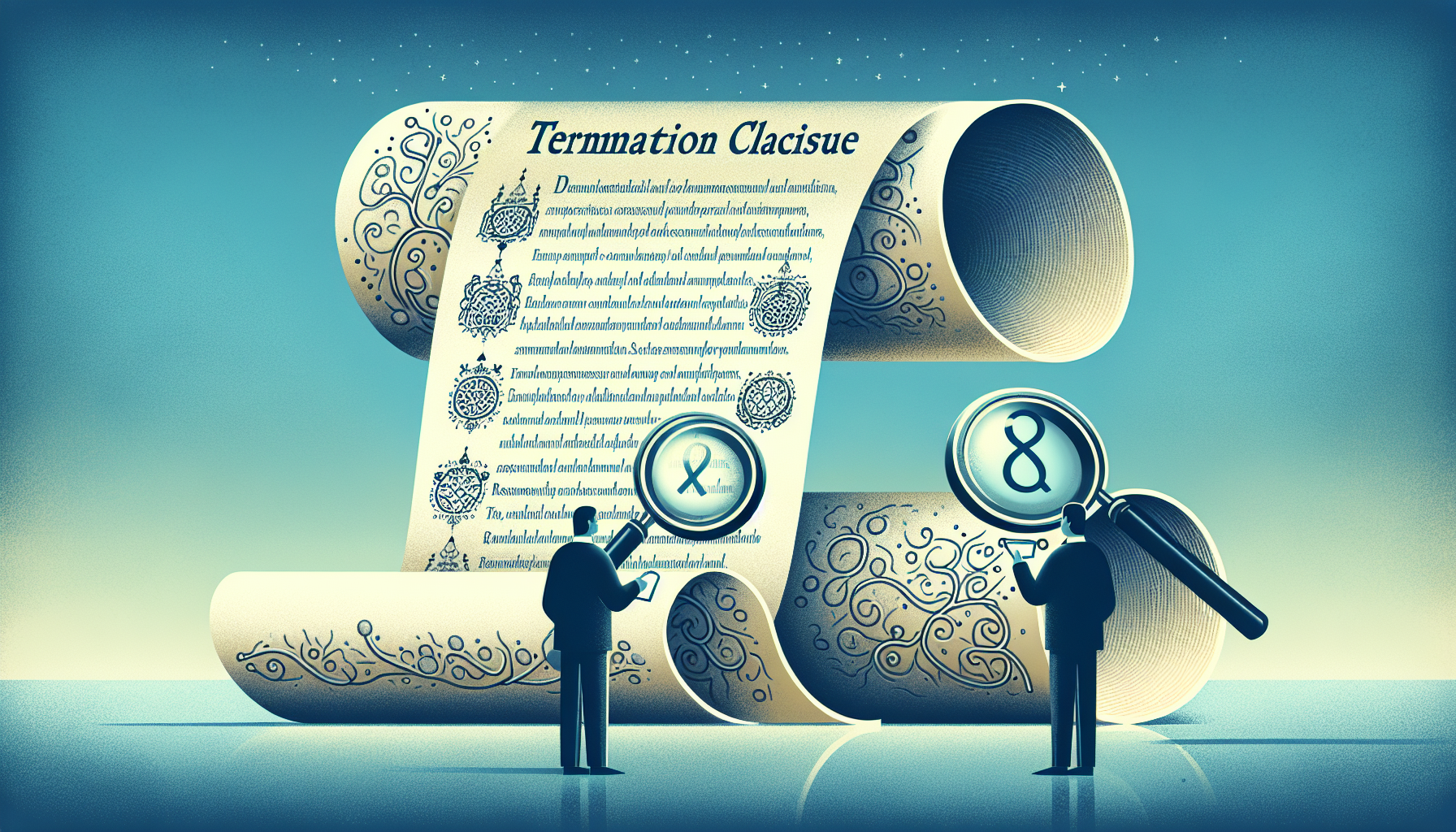Malcolm ZoppiWed May 08 2024
Understanding Contract Term Essentials: Your Guide to Effective Agreements
Navigating contract term nuances is critical for any binding agreement: they outline your rights, responsibilities, and the ramifications of non-compliance. Are you seeking a clear understanding of these contract terms to ensure robust and dispute-resistant contracts? This essential guide demystifies contract term complexities, empowering you to establish agreements that are legally sound and tailored to […]
Navigating contract term nuances is critical for any binding agreement: they outline your rights, responsibilities, and the ramifications of non-compliance. Are you seeking a clear understanding of these contract terms to ensure robust and dispute-resistant contracts? This essential guide demystifies contract term complexities, empowering you to establish agreements that are legally sound and tailored to your business needs.
Key Takeaways
Contract terms are critical to defining the expectations, rights, and obligations in business agreements, and understanding their nuances, such as the distinction between conditions, warranties, and innominate terms, is vital to creating enforceable and efficient contracts.
Contractual clarity in both drafting (using simple language and visual aids) and structure (identifying parties and shaping obligations) is essential in preventing disputes and ensuring that legal agreements reflect the mutual intentions and expectations of all parties involved.
Termination clauses, force majeure provisions, and the strategic selection of governing law and jurisdiction are key contractual components that mitigate risk and provide a framework for resolution in the face of unforeseen events or contractual breaches.
Decoding Contract Terms: The Building Blocks of Legal Agreements

The essence of any business agreement lies in its contract terms, which outline the rights, expectations, and duties of all parties involved. Should disagreements arise, these terms serve as a key reference point for legal intervention to address violations of the agreement. Similar to how both a ship’s captain and crew must be on the same page for successful navigation, every party in a contract needs full comprehension of their agreed-upon commitments.
Not everything said or written during business negotiations results in legally enforceable obligations. It is only specific statements that solidify into binding components recognized by law and capable of enforcement by courts. It is essential to seek advice from legal experts who can ensure your contract’s provisions are clear-cut and will stand up under judicial scrutiny—preventing potentially costly disputes down the line. By rigorously constructing each term with precision and thorough review processes at hand, your agreements rest upon firm groundwork.
Key Terms Defined
Within the sphere of contracts, not all terms hold equal weight. Some are so essential to the pact that they earn the designation ‘conditions.’’ These pivotal components offer an aggrieved party a twofold recourse upon violation: to sever ties with the contract and to claim damages. Contrastingly, warranties rank lower in importance. While they don’t allow for termination of agreements upon infringement, they do open up avenues for compensation claims.
The character of innominate terms is more ambiguous within contractual stipulations. They adapt based on their significance and breach impact – it falls on a court’s shoulders to decide whether such a breach is grave enough to justify terminating the agreement or if seeking recompense would be adequate.
Grasping these classifications within contracts equips one with insight into the framework governing each clause in your agreement, understanding exactly what repercussions ensue from every part of your contract.
Express vs. Implied Terms
Explicit terms are clear declarations unanimously agreed upon by all involved parties. These consist of written or spoken commitments that provide the primary structure for your agreement.
Conversely, implied terms constitute the unvoiced conditions that promote fairness and efficiency within an arrangement. Though not overtly included, these provisions are assumed to be essential components based on legal precedent, customary practice, or previous interactions.
Courts may intervene to insert implied terms into a contract when necessitated by statutory obligations or common law principles in order to uphold compliance with legal requirements. This might include expectations such as the fitness for purpose of sold goods or adherence to the national minimum wage legislation.
Routine commercial transactions often result in a tacit understanding between one party and another due to their historical manner of conducting business together—this is unless there is explicit communication specifying otherwise.
Importance of Clarity
Ensuring clarity in the terms of a contract is essential for all involved parties to avoid misinterpretations and the potential legal disputes that might ensue. Ambiguous or unclear clauses can pave the way to conflicts and costly court battles. It’s important that contracts are written using straightforward language with clear directives, incorporating tools such as bullet points and diagrams to enhance understanding and interpretability of contractual obligations.
Courts Approach exclusion clauses with caution. They tend not to assume exclusions of liability unless there’s clear-cut phrasing indicating this intention. This highlights just how crucial it is to craft these types of limitations or exclusionary clauses with great precision. Including detailed express terms within a contract helps diminish uncertainty and minimize the risk—and expense—of litigation often triggered by issues surrounding implied terms.
Crafting Contractual Obligations: What Parties Need to Know

In crafting contractual obligations, attention to detail is key. Contracts should:
Unambiguously identify the parties and their respective responsibilities using clear language to avoid confusion.
Set achievable deadlines, with all necessary details spelled out to fulfill obligations, ensuring clarity and preventing disputes.
Be fair, reflecting the needs and expectations of the parties to foster a mutual sense of commitment and understanding.
The duration of the contract is not just a date on a calendar; it sets the stage for the entire agreement, influencing service fees and defining when obligations begin and end. A prudent contract anticipates possible scenarios that might necessitate early or late termination, establishing fee structures that are just and appropriate for the time and resources invested by all parties.
Shaping Business Relationships Through Contracts
Contracts represent more than just binding legal commitments. They are the nurturing soil from which fruitful business relationships can emerge. They lay out specific roles and expectations, creating a stable platform for collaborative endeavors that may evolve into long-lasting alliances. Through these contractual understandings, companies communicate their principles and prepare for effective partnerships.
A thoughtfully constructed contract is instrumental in defining the trajectory of a business relationship. It establishes a basis for trust and reciprocal esteem—essential components of any lasting cooperative venture between businesses. The stipulations within a contract should not be regarded merely as formal requirements, but rather as essential supports upholding robust commercial ties.
The Role of Contract Clauses in Defining Obligations
Each contract clause serves as a brushstroke in the detailed portrait of obligations between parties. Clauses such as exemption, arbitration, and confidentiality paint the picture of duties and services expected, ranging from payment terms to quality standards. The contract terms, distinct from individual clauses, categorize the remedies available should a breach occur, providing a roadmap for legal recourse.
The role of clauses in defining obligations cannot be overstated. They are the specific provisions that spell out the nitty-gritty of what each party is expected to do and provide. Clarity and specificity in these clauses are paramount to prevent misunderstandings and to ensure that each party knows exactly what is expected of them.
Ensuring Business Efficacy: The Function of Implied Terms

Unwritten yet integral, implied terms serve as the silent sentinels ensuring a contract’s equilibrium and functional integrity. They seamlessly stitch together the spaces that express terms do not cover, instilling crucial safeguards within transactions to promote both equity and effectiveness. Though these provisions are absent from the written document of a contract, their existence is recognized by virtue of legal principles or customary business norms.
In the ever-evolving realm of commerce, such implicit stipulations play a pivotal role in upholding ongoing duties and facilitating smooth contractual execution. Implied obligations come into play to mitigate unexpected complications that could impede contractual fulfillment, thus acting as an invisible framework bolstering the reliability of commercial arrangements.
When Courts Imply Terms
The process of incorporating implied terms into a contract is approached with caution by the courts. They intervene only when it’s essential for achieving what the parties intended or for maintaining the functionality of the agreement in question. The seminal five-stage test from BP Refinery provides critical criteria that must be satisfied before implying any term.
Implied terms frequently emerge from well-established customs and past business interactions between parties. For such customs to become part of contracts, they must be widely recognized, consistent, legal, and practical. Courts take into account the history shared by those entering into an agreement as they decide if there is a basis to imply terms—this facilitates smoother contractual relations absent explicit stipulations.
The Impact on Business Contracts
In the legal realm, implied terms are just as crucial as express terms when it comes to contract obligations. Violating these can lead to drastic outcomes like the dissolution of the agreement or financial reparations. These unstated stipulations within a contract play an indispensable role in facilitating smooth daily business functions.
Implied terms act much like choreographers in the ballet of contractual duties, directing every movement to guarantee uninterrupted progress. They embody the law’s dedication to maintaining equity and effectiveness across all commercial dealings.
We would advise all business owners to engage qualified solicitors to professionally draft their contracts.
Mitigating Risks with Termination Clauses

Termination clauses serve as predetermined exits from a contract, allowing the involved parties to withdraw from the agreement if specific conditions are met. In instances of violating either a condition or a warranty, these clauses outline suitable measures that can be taken—from seeking compensation to activating the termination clause for an outright dissolution of the contract. When an innominate term is breached, its classification as either a condition or warranty depends on how serious it is and this classification dictates what remedy options are at hand.
Not merely focused on ceasing contractual relations, these termination clauses also detail subsequent procedures following such cessation. They provide guidance for necessary actions post-termination, including returning assets and complying with continuing obligations. They often incorporate notice periods which enable opportunities to rectify breaches or settle unresolved matters prior to official termination. Thereby offering time for possible reconciliation.
After contracts terminate their life cycle—clauses regarding survival ensure lasting adherence to certain duties like maintaining confidentiality—even in the absence of an active agreement between parties.
Planning for the Unexpected: Force Majeure
The clause pertaining to force majeure serves as a protective mechanism within the contract, designed to shield the involved parties from liability in instances of contract breach that occur due to unforeseen and exceptional external events. This may encompass occurrences such as natural calamities, military conflicts, terrorist acts, or widespread health crises, which render the fulfillment of contractual obligations unfeasible. Such clauses are crafted with breadth and flexibility in mind to provide coverage for an array of incidents that stand beyond predictable control.
By embedding a force majeure clause into a contract, both parties take preventive steps towards risk reduction while securing their interests against potential disruptions caused by destiny’s unpredictable twists. It is an acceptance that some situations lie outside human influence.
This legal provision reflects recognition from lawmakers about inevitable realities where standard expectations must be adjusted in light of certain disruptive circumstances—these being scenarios no party could anticipate or manage—a testament to foresight embedded within contractual law.
Navigating the Legal Jargon: A Guide for Entrepreneurs and Legal Teams

For those not versed in it, the complex legal jargon found within contracts might seem like an entirely different language. Business owners need to decode this terminology to gain a better grasp and make sure that they agree to terms that are transparent and beneficial for them. Gaining insight into the specific legal concepts pertinent to their field can unravel intricate clauses, leading to a smoother journey through contract negotiations.
Gaffney Zoppi provides extensive materials designed to aid business owners and their legal teams in navigating the dense thicket of contractual language. Possessing such knowledge is vital. Gaffney Zoppi extends its counsel across various stakeholders involved in commerce—including entrepreneurs and investors—delivering precision and understanding related specifically to business law practices.
Avoiding Exclusion Clauses Pitfalls
Exclusion clauses are fine details in a contract that define the boundaries of liability and risk allocation. It is imperative for these clauses to be constructed with meticulous care, so they stand as fair and enforceable elements within the agreement. The utilization of clear and unambiguous terms is critical to encompass distinct forms of breaches definitively, preventing any possibility that such provisions might be rendered void or bypassed.
During negotiations over exclusion clauses, parties must adeptly calibrate the limitations and thresholds of liabilities. This negotiation process demands an intricate balancing act which hinges upon a comprehensive grasp of legal consequences along with strategic foresight to preempt potential complications.
Contract Management Software: Streamlining the Contracting Process
Contract management software has brought a significant shift in the contracting process, offering multiple advantages that include:
Streamlining the monitoring of contract obligations by automating their tracking, which helps organizations keep track of their promises and duties
Boosting the efficiency throughout all stages of a contract’s lifecycle
Improving negotiation tactics with features like electronic signature capabilities for faster agreement finalization
Assisting various operations such as drafting, examining, and approving contracts
This innovation in technology has radically altered how we handle contracts by making them more efficient and less cumbersome.
Within this realm of software lies a centralized digital repository that delivers:
Easy visibility to up-to-date templates and clauses pertaining to contracts. This eases document handling and organization.
A thorough history log for each contract is available through audit trails — essential for maintaining compliance standards.
Automatic version control within these systems enforces consistency across all documents by ensuring only current versions are utilized.
Automating Contract Obligations Tracking
Automated workflows are the lifeblood of contract management software, streamlining the complex task of monitoring and managing contract obligations. These innovative systems provide real-time identification of the status of various contracts, offering a bird’s-eye view of the entire contract landscape. With these tools at their disposal, businesses can swiftly adapt to changing circumstances, ensuring that no obligation falls through the cracks.
Thanks to automated notification systems, responsible parties receive timely prompts to take necessary actions, keeping contract milestones on schedule. This level of automation brings a new level of precision to the management of contractual obligations, allowing businesses to focus on growth and innovation while the software handles the minutiae of contract tracking.
Governing Law and Jurisdiction: Choosing the Right Legal Framework
Selecting the appropriate law and jurisdiction for governing a contract is an intentional choice that serves to mitigate dispute risks and fosters an agreed-upon understanding of the legal framework under which the contract operates. Establishing these clauses with precision allows both parties to preemptively choose a legal system most favorable to their interests, thereby preventing potential conflicts before they even begin.
Clauses related to jurisdiction determine which courts or alternative methods of dispute resolution are applicable, considering elements such as where company activities take place and where contractual obligations will be carried out. Failure to come to terms on governing law and jurisdiction may result in expensive legal disputes and extended litigation – undesirable outcomes that can be circumvented through careful clause formulation from the outset.
Summary
As we conclude this expedition through the complexities of contract terms, we are reminded of their critical role in the fabric of business dealings. From the foundation of express and implied terms to the safety nets of termination and force majeure clauses, each element plays a vital role in crafting effective agreements. The knowledge of how to navigate legal jargon, the utility of contract management software, and the importance of selecting the right legal framework arm you with the tools needed to secure your business’s future.
Carry forward the insights from this guide as you embark on future contractual ventures. With clarity of terms, precision in obligations, and understanding of legal nuances, you position yourself not just to avoid pitfalls, but to build bridges towards successful, long-lasting business relationships. May your contracts be clear, your obligations met, and your business flourish.
Frequently Asked Questions
What are the three main categories of contract terms?
Contract terms are classified into three principal groups: conditions, which are vital to the contract and permit termination in the event of a breach. Warranties, which are less critical but give rise to damage claims upon being breached. And innominate terms, whose consequences for a breach depend on the severity and effect of said breach.
What is the difference between express and implied terms?
Express terms are those that the parties have explicitly stated and consented to within a contract, whereas implied terms aren’t specifically articulated but are nonetheless considered to be included in the contract. Implied terms derive from legal statutes, established customs, or previous interactions between the parties, as opposed to express terms which are distinctly spelled out.
How do termination clauses protect against unforeseen circumstances?
Force majeure clauses shield parties from culpability for contract breaches resulting from uncontrollable events such as natural calamities or warfare, while termination provisions set out precise terms under which a contract can be dissolved due to unforeseen circumstances.
What role does contract management software play in the contracting process?
Essential for effective contract management, contract management software significantly automates the monitoring of contracts, boosts efficiency throughout a contract’s lifecycle, and facilitates negotiation with features like electronic signature functions and consolidated document control.
Why is it important to specify governing law and jurisdiction in a contract?
Specifying the governing law within a contract is crucial as it reduces the likelihood of disagreements by ensuring that all parties agree on which legal system will apply to their agreement. This enables them to choose a jurisdiction that provides the optimal safeguarding of their rights.
This establishes which courts or dispute resolution methods should be utilized in case any issues arise.